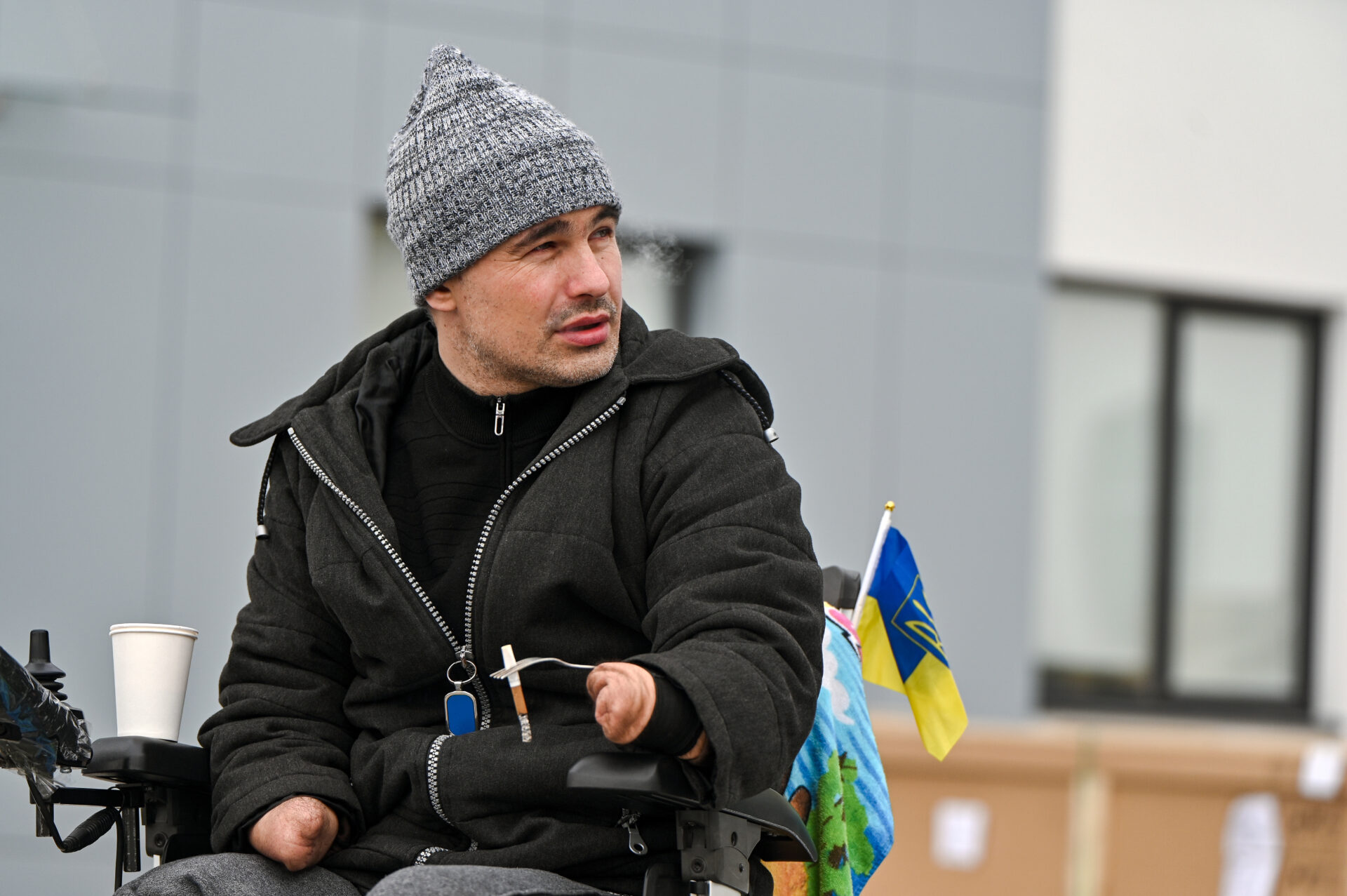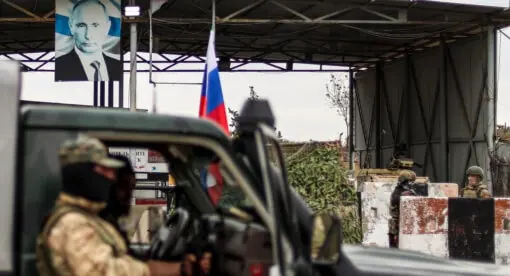If the Russia-Ukraine war were to end today, the current infrastructure in Ukraine would be ill-equipped to address veterans’ medical and mental health needs. An estimated 100,000 out of the 1 million veterans in Ukraine require rehabilitation after having been wounded on the front lines. An estimated 300 new amputees are created every day, and there are reports of patients arriving for treatment in “overwhelming numbers.”
Not investing in Ukraine’s rehabilitation infrastructure would be a detriment to Ukrainian society, economic prosperity, and long-term national security interests. Addressing the health needs of Ukrainian combatants now would give a much-needed jump-start to reconstruction efforts. Estimates from the Ministry of Veterans Affairs places the total number of veterans by the end of Ukraine’s conflict with Russia at 5 million. It is imperative that Western governments help Ukraine build modern rehabilitation infrastructure in Ukraine before the end of the war.
Since January 2022, the United States has sent over $75 billion in assistance to Ukraine, $1.6 billion of which was earmarked as humanitarian aid, which includes veterans care. The exact amount the U.S. government has provided in veterans care is presently not a published statistic, as this area has received inadequate attention. The $75 billion also does not account for additional funds the Biden administration has given to allied states assisting with the war effort. For the United States, one benefit of supporting a Ukrainian victory over Russia is learning how to treat large populations of veterans and civilians suffering from the devastating effects of conflict, to be prepared in the event of facing a near-peer adversary such as Russia or China. To promote U.S. interests for enhancing international stability and global security, as well as to enhance the economic, social, and national security situation in Ukraine, U.S. lawmakers should seek to address the medical and mental health needs of hospitalized Ukrainian soldiers and veterans.
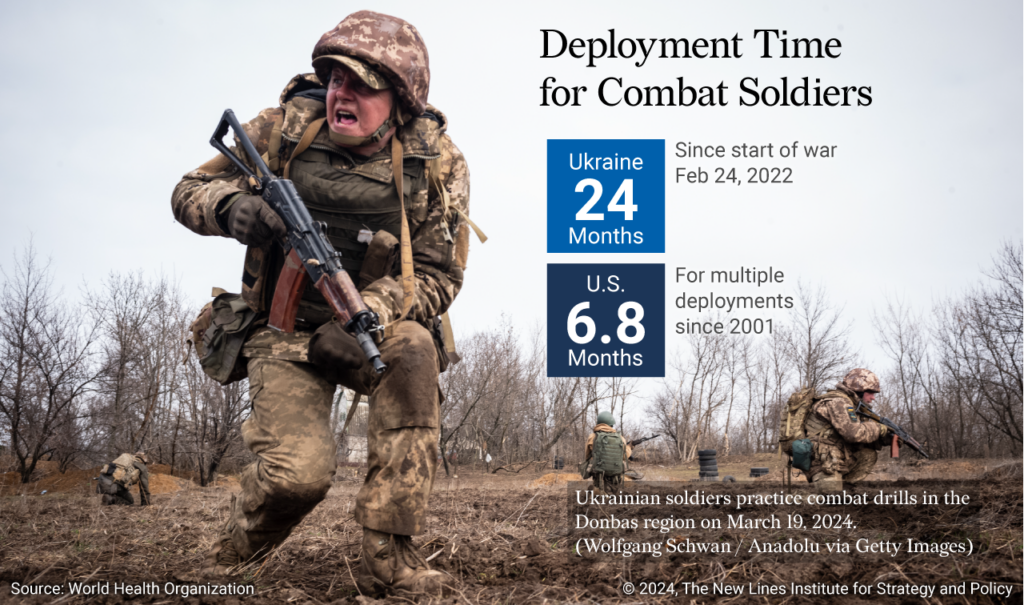
Ukraine Is Struggling Due to Inadequate Veteran Care
Options for Ukrainian veterans receiving care are less than ideal. For example, the country has just one rehabilitation center, in the northwestern city of Rivne, dedicated to treating spinal injuries, and that facility has just 100 beds. Such a gap in care will result in a reduced quality of life, as depression can often follow physical injuries.
Ukraine’s infrastructure for rehabilitating veterans is in desperate need of an overhaul. The Ukrainian Rada in September 2023 passed a law acknowledging the state’s mandate to provide for the treatment of wounded veterans and indicated an objective of having a single system of rehabilitation centers under the Rada’s authority. The law mandates cooperation with the international community, including international medical and mental health experts, along with the World Health Organization (WHO), for veterans to be relocated abroad, if needed, for treatment. However, a lack of physical and economic resources exacerbated by the war has stifled attempts to implement this policy.
Inhibiting the speed of rehabilitation is the bureaucratic process in the Ukrainian health care system. Presently, maimed soldiers must compile 12 documents before they can be outfitted with a prosthesis, and a lack of necessary equipment at rehabilitation facilities causes them to fall short of international standards. Nongovernmental organizations must help guide veterans through the health system’s bureaucratic maze to receive benefits the state says are available to them. Over 18 authorities at various levels of government provide veterans benefits, leading to a lack of system oversight.
In a survey of 593 Ukrainian veterans, only 48.4% of respondents knew they had access, through the Ministry of Veterans Affairs, to services to help them transition to civilian life. Ukrainian defenders also may not understand the financial benefits they are eligible to apply to receive. This lack of awareness of care availability may lead to greater economic insecurity for Ukrainian veterans.
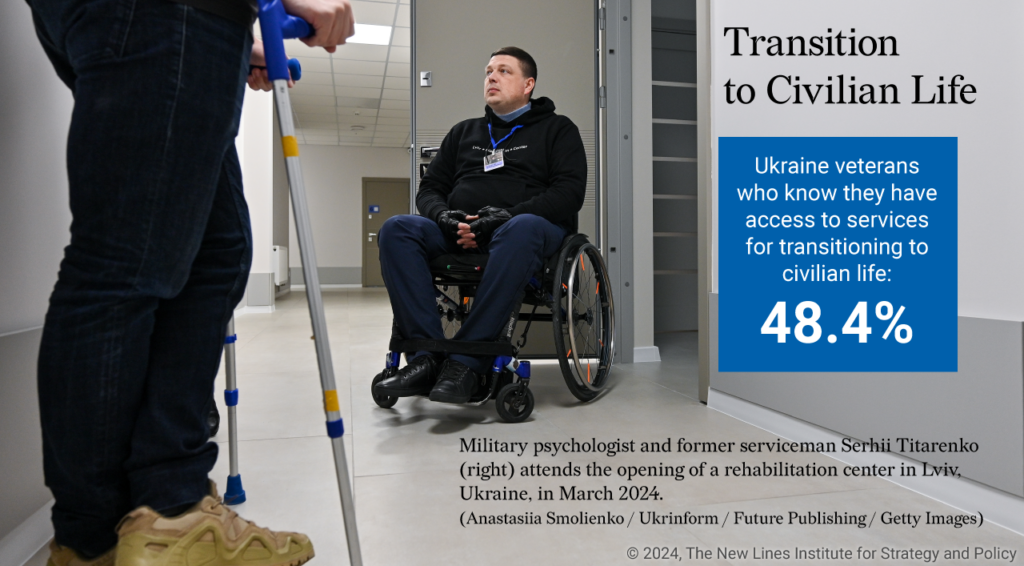
The Ukrainian health care system also is affected by a shortage of medical professionals. Many Ukrainian doctors and scientists who were best equipped to assist in the rehabilitation of Ukrainian veterans have left the country. Their absence puts a further strain on medical care on the front lines and weakens Ukrainian hospital systems and veterans’ rehabilitation centers.
Lack of Mental Health Resources
A lack of treatment professionals has left Ukrainian soldiers and veterans without adequate mental health care, as the Ukrainian government has acknowledged a need for more psychologists. A WHO report estimates there is one psychologist in Ukraine for every 100,000 people. By contrast, the average number of psychologists per 100,000 people is 33.9 in the U.S. and 48.7 in France. It is not uncommon for Ukrainian male veterans to reject psychological help, with self-medication and broken relationships resulting from the decision not to address the trauma of combat. When Ukrainian male veterans are willing to speak with a psychologist, there are often not enough available to meet the demand.
Psychologists in Ukraine face challenges as well. Many are under intense pressure and have limited training regarding addressing veterans’ psychological issues. First responder teams in Ukraine often have psychologists available to respond to attacks on civilian infrastructure, but they must also process their own emotions after dealing with the grief of the civilian population. Crisis staff who answer mental health phone calls from distressed civilians have also reported anxiety and depression.
Male veterans in Ukraine often report that they only want to process their trauma with male psychotherapists who also have seen combat. Compounding the problems around Ukrainian veterans seeking help is a Soviet-era attitude against the benefits of psychotherapy. Groups that are sensitive to being stigmatized, such as Ukrainian veterans, can be even more difficult to reach with mental health care than the general population.
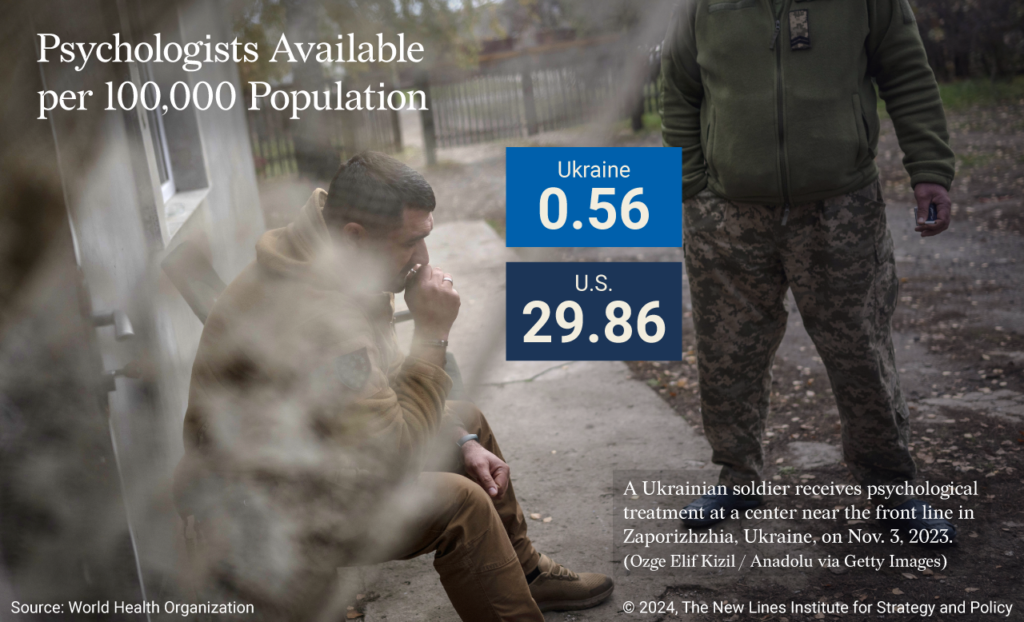
Population Decline
The psychological weight of this war has exhausted the Ukrainian population. Families are torn apart as fathers are mobilized to fight, leaving children to grow up without their fathers’ presence, and mothers often live abroad with their children. Ukrainian demographers are concerned that when fighting-aged men are allowed to leave the country again, they will join their female partners abroad rather than bringing their families home to Ukraine. The drop in population would lead to a decline in Ukraine’s economy. Ukraine was already experiencing a rapid decline in its ethnic population, and the losses of Ukrainians to war have made this trajectory worse.
Ukraine also is facing low birth rates. The country had one of the lowest birth rates internationally prior to the full-scale invasion, where low fertility combined with Ukrainian emigration and high mortality rates led to the decline in its population prior to the 2022 invasion. A protracted conflict with high loss of life for Ukrainian men will further reduce the birth rate after the war. Already, childbirth rates have dropped by 28% since February 2022. Presently, Ukraine’s population trajectory is set to further decline by 16% over the next 20 years. Furthermore, the Russian government has reportedly taken 700,000 children from Ukrainian territory into Russian territory since February 2022. While it is already questionable whether a baby boom will happen in Ukraine after the war due to the high number of people who have left the country, once the war is over and Ukrainians feel more secure, not addressing post-traumatic stress disorder (PTSD) appropriately could further impede a potential baby boom.
Fear of intimacy may result when partnered or unpartnered soldiers are suffering from PTSD. As feelings of fear increase, the biological functions necessary for sexual relations shut down. In the United States, the National Institutes of Health declared that U.S. male veterans with PTSD experienced sexual dysfunction in 60% to 85% of cases. Current methods of psychological treatment of PTSD are not yielding results in fixing sexual dysfunction symptoms; in one study to address sexual dysfunction due to PTSD, patients with higher rates of PTSD (57%) than the control population (17%) were using psychotropic medications. Psychedelic drugs are found not to be useful in the treatment of sexual dysfunction in patients with PTSD.
Mental Health Solutions
In addition to assisting with the training of psychologists in Ukraine, helping its government implement other international models for the psychological care of veterans may be useful. The Israeli government utilizes combat fitness teams comprising not only combat instructors but also psychologists and psychiatrists. In addition, the use of peer interventions, such as the Israeli YaHaLOM program, allows for soldiers to help their peers identify stressors and to intervene with psychological support in the field. The program was so successful that the U.S. military adopted a version of it called ICOVER. Such training implemented in Ukraine may prove useful in mitigating negative psychological outcomes in Ukrainian military units, thereby reducing the difficulty of cases that arrive in rehabilitation facilities.
Another part of the Ukrainian military’s attempts to address the country’s mental health crisis is through drug trials. One clinic in Kyiv is implementing the use of ketamine on veterans. The Economist reports that one special forces unit of the military is using ketamine to return their soldiers to the front lines faster. Ibogaine is another psychotropic drug that is being used to treat traumatic brain injuries and to help soldiers who are fatigued from battle. Ukrainian lawmaker Dmytro Gurin has argued to the EU that there should be widespread trials of psychedelic pharmaceuticals to aid with mental health rehabilitation.
A Template for Working With Veterans
Just as the United States uses Ukraine as a proving ground for weapons systems, it can benefit from understanding the dynamics of rehabilitating and reintegrating a large veteran population into society. While current bipartisan foreign policy thinking shies away from engagement in involving U.S. troops in prolonged conflicts, if history is any indication, the U.S. will likely be in such a conflict again. Knowing how to address at large scale the psychological trauma from such a war will greatly benefit the United States.
A review of U.S. response to veterans’ mental health can shed light on this issue. As of 2021, a reported 7% of veterans and 13% of active-duty U.S. military have PTSD, and those rates are higher for the veterans of the Iraq and Afghanistan wars at 25%. PTSD is associated with many problems, including higher tendencies of suicide, personality disorders, mood and anxiety difficulties, substance abuse, sexual dysfunctions, and interpersonal complications. PTSD symptoms include but are not limited to: hypervigilance, anger and irritability, negative mood, and alienation from loved ones. Finding better methods of treating PTSD in Ukraine will assist the U.S. government in addressing its own veteran population. Already the United States has hosted small delegations of Ukrainian medical professionals to demonstrate how intensive trauma facilities can be operated. A large-scale collaboration will be useful to both governments in the future.
Helping Ukrainian veterans will have a positive impact for current and future investment by U.S. businesses in Ukraine. The health of Ukrainian society and their veterans directly impacts the ability of U.S. businesses to invest in that country in the future. Laying a strong rehabilitation infrastructure for development in Ukraine will require understanding and meeting the needs of their veteran population. The United States can then apply those lessons to its own veteran population’s care.
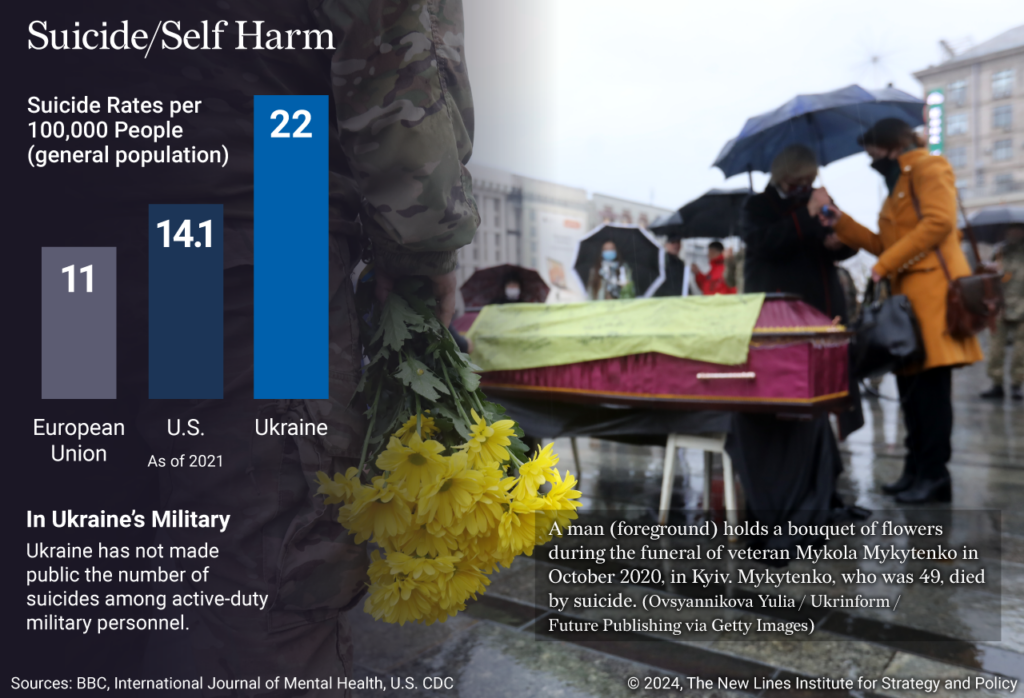
Policy Recommendations
Modernize rehabilitation facilities: The United States and its Western allies should allocate a minimum of $100 million to ensure rehabilitation facilities in Ukraine have the equipment and medical personnel required to adequately treat the medical and mental health needs of Ukrainian soldiers.
Digitize records: An electronic database with veterans’ health data and pertinent documentation should be developed. The Interim U.S. National Security Strategic Guidance instructs the U.S. government to advance global health, to promote rehabilitation as part of advancing global human rights, and to work with allies to invest in new technologies toward this end. More than simply modernizing the rehabilitation system in Ukraine, the U.S. should aid in the development of cutting-edge rehabilitation technology for Ukraine’s veterans, which would in turn aid U.S. rehabilitation programs.
Communicate better with veterans: Ukrainian veterans should be told about the list of psychological providers the government now has available. Social workers may be able to guide veterans through the process. The government of Ukraine should have its international partners, including the U.S., help fund this endeavor. Videos may be provided to help guide veterans in the process of navigating Ukraine’s bureaucratic procedures to seek treatment.
Incentivize the return of medical professionals: U.S. lawmakers should consider offering U.S. military medical personnel to help assist in Ukraine. The U.S. may also consider helping the Ukrainian government provide economic incentives to encourage medical personnel and scientists who have left the country to return. Offering higher salaries than seen prior to the outbreak of the war may reduce the number of individuals going abroad or may encourage the return of those who have left. Removing the requirement for female doctors to register with the military would likely reduce the number of medical professionals taking refuge abroad.
Fill the mental health treatment gap: The United States should invest in training psychologists to work in Ukraine. The U.S. should implement an expedited admissions process for Ukrainian veterans to learn in American universities free of charge, and it should pay for translators to help speed the process of training Ukrainian veterans to become psychologists.
Training Ukrainian male veterans to be psychologists is particularly important. Mass enrollment in online education courses for Ukrainian combat veterans who have already undergone their own psychological course of treatment would be a solid initial step in building a psychological treatment infrastructure in Ukraine. U.S. lawmakers may seek to invest research funding into assisting in the training of Ukrainian psychologists in family reintegration and PTSD.
That training should include therapists who specialize in understanding the impact of PTSD on partnered relationships and family reintegration, both of which have been understudied in U.S. veteran populations. Ukraine’s large civilian and veteran populations can provide insight into the most effective therapies for reintegrating families. The U.S. has never had large numbers of soldiers deployed for more than two years without troop rotation, so understanding how family reintegration and PTSD treatments are effective in such a scenario can enhance societal resilience in the face of long-lasting conflict.
Additionally, psychologist- or psychiatrist-led group therapies and programs where veterans can support each other should be developed. Such groups can be utilized not only to continue camaraderie but also to allow the limited number of psychologists to reach a greater number of people per therapeutic session. A program at the national level to orchestrate such small groups should be implemented with great haste while the country attempts to educate and train psychologists.
Veterans may benefit from influential leaders sharing their own mental health struggles publicly. When stigmas around receiving mental health care are reduced, veterans may be more willing to discuss what they have seen and experienced during times of war. Psychologists may work with commanders in the Ukrainian military, as seeing men in authority discuss their own mental health struggles may embolden the rank and file to seek treatment.
Address PTSD in Ukrainian soldiers: A focus on researching the improvement of sexual health for soldiers with PTSD could help save the lives of personnel. There are benefits of engaging in intimacy for partnered soldiers, as strong and safe partnerships can yield healing results from trauma. A study of 712 U.S. National Guard members indicated that positive partnering for these soldiers led to less suicidal ideation. Suicidal ideation increases when sexual dissatisfaction is present in intimate partner relationships for service members with PTSD.
Invest in pharmaceutical trials: Lawmakers should seek to provide incentives such as government subsidies to U.S. pharmaceutical companies to do drug trials in the Ukrainian veteran populations with the objective of finding a PTSD treatment in between the extremes of antidepressants and psychotropics. Doing so will not only help strengthen the sociological fabric of Ukraine but also can help prepare the U.S. to better treat its own veteran population. Furthermore, companies should be assigned liaisons through USAID or the State Department to guide them in interfacing with the necessary Ukrainian government authorities.
The views expressed in this article are those of the author and not an official policy or position of the New Lines Institute.

